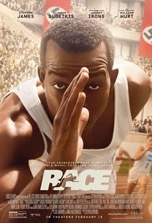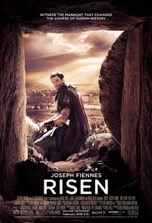March 2016
The Young Messiah (PG-13)
26/03/16 02:37 Filed in: 2016

Starring: Adam Greaves-Neal
March 2016
The below comments (in Black) were originally tweeted in Real-time from the back row of a movie theater and appear @BackRoweReviews. Though efforts were made to tease rather than ruin this movie’s memorable lines and moments, some spoilers may exist in the following evaluation (in Red). For concerns over objectionable content, please first refer to one of the many parental movie guide websites. All ratings are based on a four star system. Happy reading!

How to draw a camel in the sand.
Death by apple.
Early miracle. #BirdResurrection
“Cavemen in Britain.” Was Britain even around back then?
“Destined to wander.” Israel has a history of wandering.
“How do you explain God to his own son?” #Dilemma
“Next time there will be no mercy.” True. #Crucifixion
Dreams run in the family. Keen observation.
“The boy must die.” Good luck with that...he dies at 33.
“He is not just a child.” Amen.
A glimpse of the future. #CrucifixionRoad
“The Romans fear the young.” With good reason.
“I like this child.” Me too.
The #AngelChild tells #Satan to keep his hands to himself.
Don’t say the word rain around #Jesus or it’ll start raining.
“She’s just a woman.” Show more respect for Mary.
Romans in the temple. Oh my!
“God is your father.” A big question is answered for #Jesus.
Final analysis: a unique telling of #Jesus’ early years with some beautiful locations and a solid cast.
Rating: 2 1/2 out of 4. Perfect casting of the central role infuses the film with joy and compassion.
A host of films have focused on the life of Jesus, and the vast majority of those have included the same basic story elements, i.e.,: his birth, ministry, crucifixion, resurrection, ascension, etc. Since the entire film focuses on the titular savior at age seven (even though the temple scene actually took place when he was twelve), The Young Messiah is an exception to the typical theological presentation. But with little to no Biblical backing for many of the events in the film, what Messiah gains in originality it loses in authenticity. Taking its cue from the recent Roman soldier spotlight film Risen, Messiah applies the 80/20 Rule to its narrative structure, with 80% of the story extrapolated from recorded history and dramatized for a mass audience and only 20% coming directly from passages in the Bible. The most noticeable deviation from the holy text is when young Jesus (Adam Greaves-Neal) performs miracles while he’s a boy living in Egypt. There’s no scriptural support for this plot point, and to the contrary, the Bible records Jesus’ first miracle at the wedding in Cana (John 2:1-11) when he was thirty. Be that as it may, the young lad having to conceal or constrain his supernatural powers is an interesting plot point that’s analogous to many comic book yarns where the hero tries to hide his abilities in order to blend in with the general populace (Superman being chief among these archetypes since, as many have noted, the Man of Steel’s messianic origin story and miracle working abilities directly parallel Christ’s). However non-canonical this subplot is, it does create tension and intrigue, especially in the early passages of the film (although I could’ve done without the gimmicky bird resuscitation scene). Also, like in Risen, Messiah features several new story elements that work quite well, including: Sean Bean as Roman centurion Severus, a conflicted soldier who is tasked with killing the young healer, and the Spartacus (1960) style Roman road flanked with crucified Jews. I was hoping that young Jesus would look up and knowingly stare at a cross…a foreshadowing of his impending demise. But alas, this is just one of many examples in the film of how an opportunity to create art was passed over (pun intended), which might speak to a lack of vision on the part of director Cyrus Nowrasteh or a shortage of shekels which shackled the production. All is not lost artistically though, since there’s a really nice aerial shot of Jesus’ family traversing the serpentine road lined with crosses at the end of the sequence. Despite period appropriate costumes and a handful of decent location shots, the film has a decidedly cash-strapped appearance. Sometimes acting can help elevate a budget-challenged picture (like Ben Kingsley in Walking with the Enemy), but such is not the case here. Other than Greaves-Neal, Bean and Sara Lazzaro (who plays Jesus’ mother, Mary), the rest of the cast members deliver par or subpar performances. All things considered, this was a valiant attempt at focusing on a brief chapter in Christ’s early years, but the writing, acting, directing and overall production didn’t support its vision or potential. Ironically, Messiah will go down as just another average Bible film that failed to inspire its audience.
London Has Fallen (R)
17/03/16 22:44 Filed in: 2016

Starring: Gerard Butler
March 2016
The below comments (in Black) were originally tweeted in Real-time from the back row of a movie theater and appear @BackRoweReviews. Though efforts were made to tease rather than ruin this movie’s memorable lines and moments, some spoilers may exist in the following evaluation (in Red). For concerns over objectionable content, please first refer to one of the many parental movie guide websites. All ratings are based on a four star system. Happy reading!

“Vengeance must always be profound...and absolute.”
#GerardButler and #AaronEckhart are in a “presidential race.” Yuk, yuk.
#KevlarMatress It’ll sell.
“40 different countries with 40 different security teams.” What could possibly go wrong?”
“Nobody knows. That’s why it’s a surprise.” The way security should be.
Amazing FX on the bridge demolition.
How many times does the president have to be told to keep his head down?
“They only have to get it right once.” Frightening reality.
“Mr. President, those better be comfortable shoes.” #PresidentialRace 2.0.
“Never criticize, always encourage.” Words to live by.
“I was wondering when you were going to come out of the closet.” Hilarious!
“They should’ve brought more men.” Yeah!
“I won’t justify your insanity to make you feel better about yourself.” #PresidentialSteel
“The worst option is to do nothing.” So true.
Final analysis: a slow start turns into a decent actioner with a frighteningly topical story.
Rating: 2 1/2 out of 4. Will this film perform well enough to justify a trilogy? How about #ISISHasFallen?
London Has Fallen, sequel to Olympus Has Fallen (2013), features the same lead characters from the first film: the U.S. President’s security chief Mike Banning (Gerard Butler), U.S. Vice President Trumbull (Morgan Freeman) and U.S. President Benjamin Asher (Aaron Eckhart). Unfortunately, the sequel also employs the same basic plot as the original, with the only major twist being that the action takes place over the pond. The story sets up with the leaders of forty countries attending a funeral in London (and isn’t that just asking for it?) and the ensuing destruction that occurs when a well coordinated terrorist attack kills hundreds and razes several key buildings inside the city. The rest of the movie is one protracted pursuit with terrorists chasing Asher and Banning through the city in a series of action segments, including: frequent firefights and fistfights, motorcycle chases and a spectacular building demolition. Whereas the action is taut, the plot is not. Besides the characters stumbling out of a helicopter crash as if they’d just gotten off a Tilt-a-Whirl (and why don’t they have parachutes on a presidential chopper?), the fact that Asher and Banning emerge from the movie’s perpetual bullet storm without so much as a graze defies credulity. The dialog is also daffy at times, i.e., the “presidential race” and “coming out of the closet” gags which are clearly played for laughs. Beyond all of its standard action movie silliness, however, Fallen 2 is a frighteningly topical (perhaps unintentionally since the movie was filmed prior to the terror attacks in Paris) story that taps into very real fears over the growing radical elements in our modern world. The movie’s underlying, unspoken message is that our foes are clever and don’t mind playing the long game in order to secure a victory. The sad truth is that individuals dedicated to the destruction of others will find a way to accomplish their mission, regardless of how long it takes or how hard it is to execute (we saw this tragically demonstrated on 9-11). This hint of social significance is really the only thing that prevents this film from becoming yet another mindless action flick. The performances are solid but are largely dialed in (even the great Morgan Freeman plays his character exactly as you’d expect him to) and the direction by Babak Najafi is prosaic when evaluated alongside the typical film in its genre. So will we see another city fall in the future (Paris is off limits…forever)? The film’s performance at the box office will have major implications for the future of the franchise, but judging from this middling and formulaic entry, the series looks like it’s fallen and can’t get up.
Race (PG-13)
07/03/16 02:12 Filed in: 2016

Starring: Stephan James
February 2016
The below comments (in Black) were originally tweeted in Real-time from the back row of a movie theater and appear @BackRoweReviews. Though efforts were made to tease rather than ruin this movie’s memorable lines and moments, some spoilers may exist in the following evaluation (in Red). For concerns over objectionable content, please first refer to one of the many parental movie guide websites. All ratings are based on a four star system. Happy reading!

“God spared you for a reason.” To run like the wind.
Nice to see that Jesse used the envelope system. #FiscalResponsibility
“Can you work?” Love how Jesse throws it back at him with his #CottonPicking story.
Metals not records. Important distinction.
“So long as they’re American citizens, we’ll accept Martians.” #RacialIntegration
“We’re going with the higher time.” #BS
Three #WorldRecords in 45 minutes. Unbelievable.
“You think track and field is hard, you should try marriage.” NK
Close vote, but no boycott.
Out on the track there’s “no black and white, there’s only fast and slow.” You tell him.
“Stop thinking so much, Jesse. It’s not what you’re good at.” Ha!
Luz helping Jesse out on the long jump is a nice moment.
The German crowd chanting “Owens” is a higher honor than the three gold medals.
“Don’t lose.” Don’t worry, he won’t.
The guest of honor has to go through the service entrance. Sad.
Final analysis: a comprehensive look at Owens’ plight as a black athlete during the 30s and his rise to fame.
Rating: 2 1/2 out of 4. Despite being overlong and slowly paced #Race is an inspirational biopic with an important message.
There’s a double meaning implied in the title of this latest Jesse Owens biopic, Race. The obvious reference is to the movie’s focus on Owens’ career as a track legend, culminating with his astounding performance (four gold medals) at the 1936 Summer Olympics in Berlin, Germany. The other meaning inferred by the title is Owens’ race—African American. The bitter irony here is that despite his tremendous athletic talent, Owens was treated with contempt both by Caucasian members of his own team and especially by citizens of the host nation, whose white supremacist ideals sought the eradication of Jews and blacks (ironically, two Jews were bumped from the 4 x 100 meter relay so that Owens could participate, so apparently blacks were a bit better than Jews in the twisted minds of the Aryan adherents). There was no safe haven for Owens on American or German soil, which makes his courageous story even more remarkable. Ultimately, this movie isn’t about black and white or fast and slow (as Owens avers in the film), but heroes and villains. Aside from Owens himself (Stephan James), Owens’ coach, Larry Snyder (Jason Sudeikis), is a driving force for good (and progress) in the film. Other heroes come from unexpected quarters, such as the appropriately named German long jumper Carl “Luz” Long (David Kross), who helps orient Owens to the course and German film director Leni Riefenstahl (Carice van Houten), who dared to defy Hitler by filming the 200 meter dash for posterity, an event Owens was predicted to win. The movie’s villains are the racist white Americans (like the brutish Ohio State University football players who force Owens to take a shower after them) and the many nationalized and propagandized Germans. Of course the Kaiser himself is the greatest villain here—besides initially banning Jews and Blacks from the Games, which nearly sparked an international boycott, Hitler refused to shake Owens’ hand in clear defiance of Olympic tradition for gold medal winners. Granted, there are a few gray characters in the film as well, such as the duplicitous Avery Brundage (Jeremy Irons) and prejudiced Olympic team coaches like Lawson Robertson (Defiance’s Tony Curran). Race has greater scope than earlier films based on Owens’ life and has the added benefit of CGI as a storytelling tool. These computer effects are most noticeable in the sweeping crowd scenes when Owens first enters the Olympic stadium in Berlin. But is the movie better off for all of its technological advances and advantages? Opinions will vary, but I think CGI was judiciously employed in the film. The effectiveness of the movie’s broad stroke approach to telling Owens’ story is also a matter of debate. Some will appreciate the movie’s in-depth history lesson and the many ancillary story lines (Riefenstahl) that are woven into the movie’s narrative tapestry. Others (like moi) will maintain that the film takes us away from the focal point (Owens) too frequently and tries to achieve too much in the social and political arenas instead of adhering to its core identity as a historical sports movie…unlike the exploits of its main character, the story isn’t very streamlined. How ironic that a movie about sprinting should be paced like a long distance run and have the running time of an average half marathon. Race is an educational and inspirational film that ultimately fails to move its audience. Sad to say, but despite its efforts to decry the injustices of prejudging a person based on their appearance, Race is skin-deep.
Risen (PG-13)
05/03/16 20:19 Filed in: 2016

Starring: Joseph Fiennes
February 2016
The below comments (in Black) were originally tweeted in Real-time from the back row of a movie theater and appear @BackRoweReviews. Though efforts were made to tease rather than ruin this movie’s memorable lines and moments, some spoilers may exist in the following evaluation (in Red). For concerns over objectionable content, please first refer to one of the many parental movie guide websites. All ratings are based on a four star system. Happy reading!

Rolling stones used in combat. Symbolic of the big one later in the story. #RollingStones
“Until then...” #RomanBrutality
“Order...order.” I got it the first time. #BreathMint
Unusual for a #Bible movie to begin with the crucifixion.
“Never killed a king before.” Not just a king. #KingOfKings
“It’s as if he wanted to be sacrificed.” Like a lamb to the slaughter. #NoGreaterLove
“A day without death.” Great dialog during the pool scene.
“We must find a body.” Let the investigation begin. #CSIJerusalem
“Wait ‘till you see combat.” Ha!
“Some say he has risen.”
The scene where #Clavius asks which of his men knows #MaryMagdalene is hilarious.
“This is what you missed.” #RomanNail #Crucifixion
“They’re everywhere!” #Bartholomew is a great character who provides some much needed #ComicRelief. #12Disciples
The sword slips through #Clavius’ fingers. Seeing #Yeshua is a disarming experience.
“No one dies today.” The pursuit by the #Roman soldiers is an exciting sequence.
#CliffCurtis is very good in his portrayal of #Jesus.
The healing of the leper gave me #Goosebumps.
The #Ascension is spectacular!
“I doubt we’ll ever hear from them again.” Wrong!
Final analysis: the #Resurrection story told from a unique POV. Benefits from solid acting and gorgeous locations.
Rating: 3 out of 4. An original yet reverent #Bible epic with one of the finest #Redemption stories ever told.
Some years ago, back when I had aspirations of plying my acting skills (such as they are) into a career, I had the lead part in an Easter cantata entitled Bow the Knee. The story focuses on a Roman centurion who has a crisis of conscience regarding the teacher named Jesus. The play presented a unique story told from the POV of an original character and echoed similar conceits in films like Ben Hur (1959) and Barabbas (1961). Like in Bow the Knee, Risen narrates the Passion of Christ through the eyes of a Roman soldier, but the twist here is that most of the story takes place after the crucifixion (which occurs early in the film). The action kicks into high gear when Jesus’ tomb is found empty and Roman Tribune Clavius (Joseph Fiennes) is put in charge of the investigation to find the body. This procedural element keeps the story rolling along until Clavius has a life changing encounter with the subject of his pursuit midway through the movie. Clavius falls in with the disciples and, by proxy, takes us on a spiritual journey which is punctuated by several key events from Jesus’ post-resurrection ministry. The 80/20 rule applies to this movie, with roughly 20% of the tale actually based on scripture and 80% extrapolated from the inspired text and presented for dramatic effect. The end result here is seeker sensitive and palatable for those with an open mind, but will probably frustrate those fundamentalist theologians who maintain that a Biblical epic must be chapter and verse (and has there ever been such a film since none of us where there 2,000 years ago to determine the story’s authenticity?). One of the most exciting elements in the story is how it weaves in and out of the official New Testament narrative, which provides freshness for those familiar with the actual events from the Bible. Some of those vignettes, extracted directly from the holy book, are extremely well executed, such as: the crucifixion, the fish bounty, the healing of the leper and the ascension. Other sequences, like when Roman soldiers pursue the disciples through tussocks of grass and winding canyons, are nowhere to be found in the Bible, but are visually exciting and help maintain audience interest throughout the story. Aside from its pioneering plot, the acting is also a boon to the film. Fiennes is superb in the lead role and plays his character’s gradual shift in loyalties to perfection. Peter Firth is exceptional as Pontius Pilate, portraying the Roman official as a flesh and blood character rather than an egomaniacal caricature. Tom Felton is effective as ambitious Roman soldier Lucius and Cliff Curtis (Fear the Walking Dead) delivers an understated, yet deeply affecting, performance as Jesus. In addition to the movie’s fine production elements, the locations have greatly contributed to the visual veracity of the film. Shot in Spain and Malta, these exteriors have helped the story come to life by accurately depicting the Holy Land during the First Century. In the end, this is a compelling story of personal redemption that just happens to be based on the Bible, and as such, should have appeal far beyond the religious set.